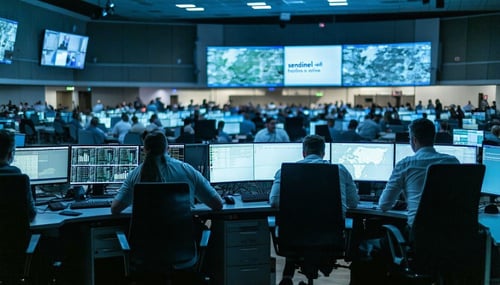Why Businesses Still Pay for Sentinel PiNG When WhatsApp Is Free
Sentinel Spaces Delivers A Paradigm Shift in Crisis Management
In today’s interconnected world, organisations often operate across multiple locations, whether within a single country or across the globe. The ability to manage crises effectively in such a complex landscape is crucial to minimising damage and ensuring business continuity.
Sentinel Spaces, the latest architectural evolution of the Sentinel platform, is designed to address this very challenge, providing organisations with a robust and flexible framework that empowers local teams while maintaining central oversight.
The Need for Localised Crisis Management
Organisations with multiple locations face unique challenges during a crisis. Whether it’s a cyberattack, a natural disaster, or a reputational issue, the specifics of the response often require local knowledge and swift, autonomous action. While central management can offer guidance and coordination, the intricacies of each situation—such as local regulations, infrastructure, and community impact—are best understood and handled by those on the ground.
For example, in the event of a cyberattack, a central management team might coordinate the overall response, advising on the implications across the organisation. However, the practicalities of containment, communication with local stakeholders, and restoration of services are tasks that often require immediate local action. Sentinel Spaces provides the necessary tools and infrastructure to ensure that these responses are both effective and secure.
Sentinel Spaces: Central Control with Local Autonomy
We developed Sentinel Spaces in response to the growing need for more flexible and responsive incident management systems. The architecture is designed to allow each location within an organisation to operate independently in a crisis while remaining accountable to a central authority.
This dual approach ensures that crises can be managed with the necessary speed and local knowledge, without sacrificing the coherence and oversight that a central management team provides.
Each “Space” within the Sentinel platform is a self-contained environment equipped with all the tools needed to manage a specific crisis. These tools include communication channels, mass notification systems, and secure chat solutions, all of which are critical for effective crisis response. Local teams can communicate quickly and securely, both internally and with external stakeholders such as customers and suppliers, ensuring that the right decisions are made promptly.
Reducing Recovery Time: The Key to Business Continuity
One of the primary objectives of any business continuity plan is to minimise downtime and accelerate recovery. Sentinel Spaces is built with this goal in mind. By empowering local teams to act swiftly and decisively, the platform reduces the time it takes to mitigate the effects of a crisis. This is achieved through a combination of pre-arranged tools, clear organisational structures, and pre-approved messages, all of which can be activated immediately when a crisis occurs.
Moreover, the platform’s architecture is designed to be resilient to the very crises it helps manage. By isolating each Space, Sentinel ensures that a crisis affecting one part of the organisation does not compromise the tools and resources available to others. This isolation is particularly important in cases where communication infrastructure might be impacted, such as during a cyberattack.
Accountability and Learning
In addition to its operational benefits, Sentinel Spaces also provides a comprehensive audit trail of all activities during a crisis. This feature not only facilitates post-crisis analysis and learning but also serves as a legal record of the actions taken. Organisations can use this data to refine their crisis management plans and ensure continuous improvement.
Conclusion
Sentinel Spaces represents a significant advancement in the field of crisis management, offering a solution that balances central control with local autonomy. For organisations with multiple locations, this architecture provides the flexibility to respond to crises effectively at the local level while maintaining the oversight and coordination necessary for a coherent organisational response.
By accelerating recovery time and ensuring resilience, Sentinel Spaces helps organisations navigate crises with confidence and agility, ultimately safeguarding their operations and reputation in an increasingly complex world.
Blog Cover Photo by Christine Roy on Unsplash
Tags:

21 Aug 2024


